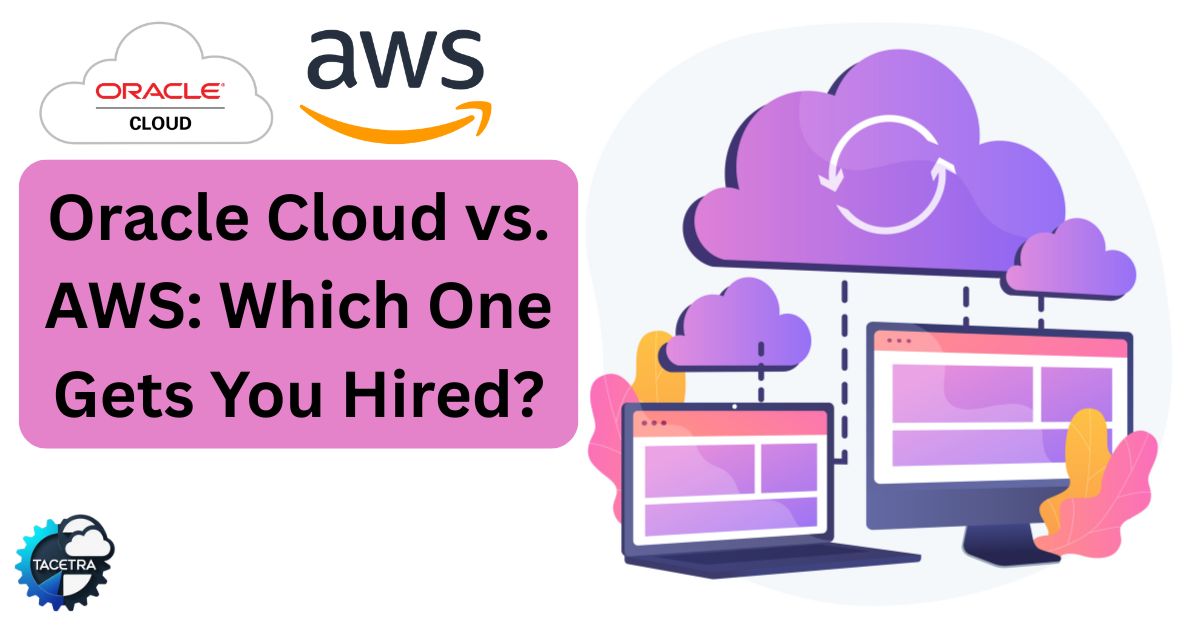A growing number of students and career switchers are asking the same question: “If Oracle Cloud is offering free certifications, should I just start there?” On the surface, it seems smart — free training, free credentials, and quick cloud exposure. But scroll through Reddit or LinkedIn, and you’ll quickly see the dilemma: Is learning Oracle Cloud Infrastructure (OCI) enough to land a job, or is AWS still the safer bet?
After reviewing hundreds of community insights, here’s the verdict: Learn OCI for the free head start — but build your career around AWS.
1. The Reality of the Cloud Market: The “Big Three” Rule
When it comes to hiring, companies aren’t treating all clouds equally. The job market overwhelmingly revolves around the Big Three cloud providers:
- AWS (Amazon Web Services): The undisputed market leader and the default choice for most startups and enterprises.
- Microsoft Azure: The corporate favorite, tightly integrated with existing Microsoft ecosystems.
- Google Cloud (GCP): Gaining ground in AI and data analytics.
While Oracle Cloud Infrastructure is growing, especially in enterprise and government use cases, its overall market share and job demand remain limited. As one cloud engineer bluntly put it on Reddit:
“OCI roles are rare. AWS is the standard, Azure is second, GCP a distant third — everything else is noise.”
Takeaway: If your main goal is to land a cloud job fast, AWS is non-negotiable.
2. Why Learning Oracle Cloud Still Makes Sense
That doesn’t mean OCI is a waste of time — far from it. Oracle’s free training and certifications offer an incredible way to learn cloud fundamentals without financial risk. The beauty of the cloud industry is that the core principles are vendor-agnostic.
Whether you’re deploying on AWS, Azure, or OCI, you’ll deal with the same building blocks:
- Compute instances
- Storage buckets
- Networking configurations
- Identity and access management
As many professionals say, “Cloud platforms are the same engine with different dashboards.” In fact, OCI was designed by ex-AWS engineers, making many of its concepts directly transferable.
Plus, OCI has a niche advantage: it’s deeply tied to data and database systems. For anyone planning to work in enterprise data engineering or database administration, Oracle’s ecosystem can be a differentiator on your résumé.
Takeaway: Use OCI as a free launchpad to understand cloud fundamentals. It’s the smartest “no-cost” foundation you can get.
3. The Smart Beginner’s Strategy
If you’re a final-year student or a career changer, here’s a simple, proven learning roadmap:
- Start with the Free OCI Training. Complete Oracle’s free learning paths and earn your OCI Architect Associate certification. It’s a great résumé boost and gives you structured hands-on experience.
- Pivot to AWS Immediately After. Once you understand cloud basics, switch to AWS and target the AWS Certified Cloud Practitioner or Solutions Architect – Associate certifications. You’ll move faster since you already grasp the fundamentals.
- Add Terraform for Portability. Learning Infrastructure as Code (IaC) with Terraform makes your skills transferable across AWS, Azure, and OCI — a huge plus for DevOps or multi-cloud roles.
Bottom line: Don’t treat the free OCI program as a detour — treat it as a springboard. You’ll save money, gain real-world skills, and be ready to pivot into AWS, where most of the cloud computing jobs and career growth await.
Final Thought
Oracle Cloud may open the door, but AWS builds the house. Take advantage of Oracle’s generosity, but keep your eyes on the bigger market. In a world where cloud expertise drives six-figure salaries and defines modern IT, your smartest move is to start free — and finish strategic.
Further Reading: Is the PMP Certification Still Worth It in the Age of Agile?
Discover more from TACETRA
Subscribe to get the latest posts sent to your email.
